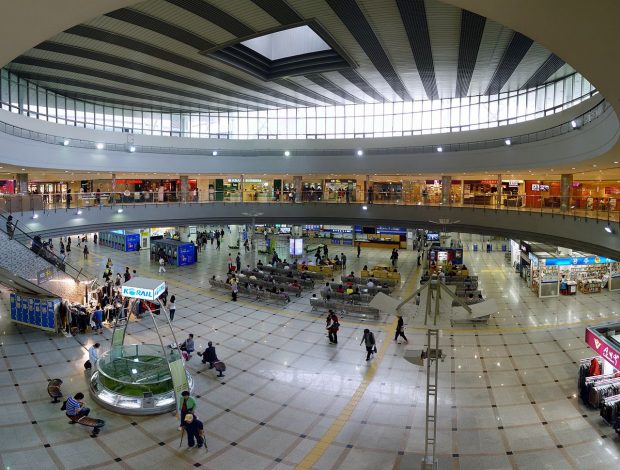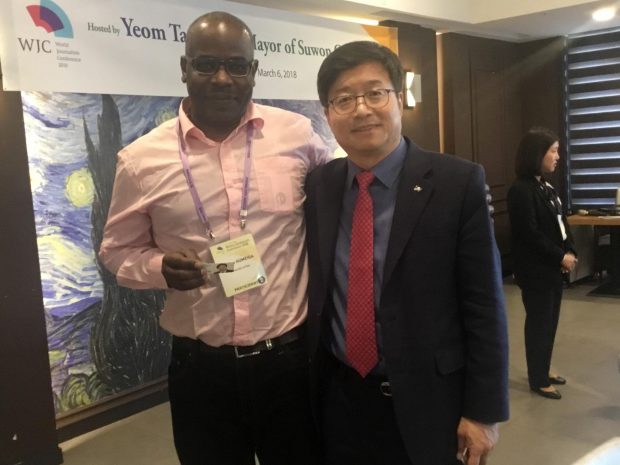Suwon City where rich history, economic boom co-exist harmoniously

Inside Suwon Station
By Dr. Hassan Humeida – Germany
SUWON: South Korea was the successful host of the World Journalists Conference on September 14-16, 2020.
The 18th conference was held as online conference, this time in the context of COVID-19, and was attended by an estimated one hundred media professionals, journalists and writers from more than 52 countries. The conference revolved around three fundamental issues: fake news, the world’s interaction with the coronavirus, the seventieth anniversary of the Korean War, and the efforts for peace on the Korean peninsula.
The conference was conducted under complex circumstances with the integrated support of Gyeonggi-do and under the supervision of its Governor, Mr. Lee Jae-myung, and with him the Mayor of Suwon City, Mr. Yum Tae-young. The global meeting was successful by all standards. This is not only because the conferences achieved results that satisfied oall people, but also because its outcomes strives to spread peace to other countries in the world.
Suwon, a city with around 1.2 million inhabitants, is located 48 kilometers from the South Korean capital Seoul. It is one of the largest cities and the capital of Gyeonggi-do. There are two transportation lines connecting Suwon with the Korean capital Seoul, the first is an express train line and the second is a subway line. Suwon is the headquarters of the center for Korean Samsung Groups.
In Suwon, in a separate area that is similar to “Silicon Valley” in the US, there are about 35,000 engineers from different fields and from all over the world.
This area, known as the “Digital District”, is the first technology center for Suwon City, Gyeonggi-do, and it is the most important technology of its kind in South Korea. Besides the “Samsung Groups”, Suwon is also the headquarters of other groups and their international brands such as “Hyundai”, “LG” and “Kia”.
Suwon is the first soccer city in South Korea. It also has the largest and most modern Olympic stadium for soccer competitions in South Korea, which was officially opened in mid-2001. Suwon is the home of the Suwon Samsung Bluewings Football Club. The club has won the K-League four times and the AFC Champions League twice. This makes Suwon one of the most promising sports cities. This is due to the availability of the necessary financial support to establish contemporary sports clubs and international sports competitions, as they are the important economic and social center in Korea.
The city of Suwon is characterized by its great historical importance, which dates back to the first century BC, when one of the sites of the Three Kingdoms of the Korean Peninsula was built in the eighteenth century BC, namely the “Hwaseong Fortress”, which was commissioned by King Jeongjo of the then ruling Joseon Dynasty. It also has a 5.7 km long wall with four gates, and this wall is the only remaining wall for an entire city in South Korea.
The Koreans have a special respect for these Joseon Dynasty rulers for their efforts to be close to the Korean citizen, his concerns, his way of life and his comfort so that he becomes an important part of a just Dynasty. The castle, which was inscribed on UNESCO’s World Heritage List in 1997, is an important historical site for Korean heritage, making it a magnet for tourists from Korea and the world.
In addition, a cultural festival called Hwaseong is held every year in October, accompanying many popular activities to commemorate the reign of King Jeongjo and his building of the historic castle with its present wall.
In addition, tourists from all over the world and many Koreans regularly come to the historic city to see the magnificent architecture of the castle with its elegant wings, landscaped terraces, city gates and the entire restored royal palace. Since the city of Suwon is attractive to tourists because of its ancient history, there is also a popular village, which was opened in 1974, and the village includes more than 260 traditional houses built on an area of 250 hectares, which are also used for making films documenting ancient history and Korean drama.

Dr. Hassan Humeida with the Mayor of Suwon City, Mr. Yum Tae Young
The current mayor of Suwon is Mr. Yum Tae-young, who studied agriculture with a focus on agrochemical technology and later became an expert on environmental issues.
In addition to his post as the mayor of the capital city of Gyeonggi-do, Suwon City, Mr. Yum Tae-young performs many executive and administrative duties throughout South Korea.
They include chairing committees to seek work and implement sustainable development goals (SDGs) that address environmental issues and their promotion, putting people at the center of attention and considering them an integral part of the surrounding environment.
Due to his specialization in the field of the environment, he is one of the most important benchmarks in the field of environmental and urban development in the creation of parks in South Korea that meet the sustainable development objectives in his country.
The efforts of Mr. Tae Young Yum are not limited to the new developments in his society with his human being and include his great interest in combining the ancient heritage with the developments of the modern times in a way that they complement each other.
In the foreground is his increased interest in preserving the historical aspect of the region, despite the economic boom in Gyeonggi-do and Suwon City alike.
Mr. Yum Tae-young is a member of the Democratic Party of Korea and is considered the right man in the right place in view of his re-election and his victory in three consecutive rounds as Mayor of Suwon City.
























































